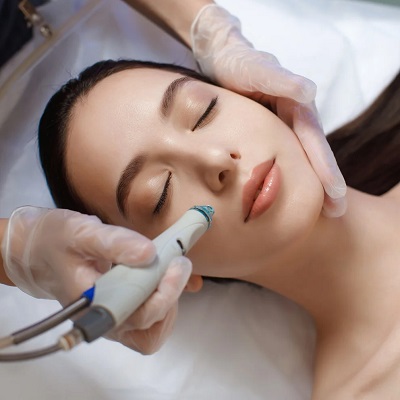When it comes to achieving radiant, youthful skin, professional treatments like HydraFacial and chemical peels are among the top choices. Both treatments offer remarkable benefits, but they work in different ways. If you’re unsure which one is best for your skin, this guide will help you understand their differences, benefits, and which option might be more suitable for your needs.
What is HydraFacial?
HydraFacial in Islamabad is a non-invasive skincare treatment that combines cleansing, exfoliation, extraction, hydration, and antioxidant infusion. It uses a patented vortex-fusion technology to deliver serums deep into the skin while removing impurities.
Benefits of HydraFacial:
- Provides deep hydration and nourishment.
- Gently exfoliates and removes dead skin cells.
- Clears out pores and reduces blackheads.
- Improves skin texture and tone.
- Suitable for all skin types, including sensitive skin.
- No downtime and delivers instant results.
What is a Chemical Peel?
A chemical peel is a skin-resurfacing procedure that uses acids to remove dead skin layers and stimulate cell regeneration. Depending on the depth of the peel, it can address a variety of skin concerns.
Types of Chemical Peels:
- Superficial Peels – Use mild acids (like glycolic or lactic acid) to exfoliate the outermost layer of skin.
- Medium Peels – Use stronger acids (like trichloroacetic acid) to penetrate deeper, treating moderate wrinkles and discoloration.
- Deep Peels – Use potent acids (like phenol) to target severe wrinkles, sun damage, and scars.
Benefits of Chemical Peels:
- Improves skin texture and tone by removing damaged layers.
- Reduces fine lines, wrinkles, and hyperpigmentation.
- Treats acne scars and breakouts effectively.
- Enhances collagen production for firmer skin.
- Provides long-term skin rejuvenation.
HydraFacial vs. Chemical Peels: Key Differences
1. Treatment Process
- HydraFacial is a multi-step, gentle procedure that involves cleansing, exfoliating, extracting, and hydrating the skin using a specialized device.
- Chemical Peels involve applying an acid solution to the skin, which exfoliates and peels off dead skin layers over time.
2. Suitability for Skin Types
- HydraFacial is safe for all skin types, including sensitive skin, as it provides hydration without irritation.
- Chemical Peels may not be suitable for very sensitive skin, as they can cause redness, peeling, and temporary discomfort.
3. Downtime and Recovery
- HydraFacial has no downtime; you can resume normal activities immediately.
- Chemical Peels require downtime depending on the depth of the peel. Superficial peels may have minimal peeling, while deep peels may need weeks for full recovery.
4. Targeted Skin Concerns
- HydraFacial is best for hydration, mild exfoliation, and overall skin health maintenance.
- Chemical Peels are ideal for reducing hyperpigmentation, deep acne scars, and more significant skin concerns.
Which One is Better for You?
Choose HydraFacial if:
- You have dry or sensitive skin that needs hydration.
- You want an instant glow with no downtime.
- You’re looking for a gentle treatment suitable for regular maintenance.
Choose Chemical Peel if:
- You want to target deep wrinkles, acne scars, or severe hyperpigmentation.
- You’re willing to undergo some downtime for more dramatic results.
- You need a treatment that offers long-term skin renewal.
Can You Combine HydraFacial and Chemical Peels?
Yes! Some dermatologists recommend alternating between HydraFacial and chemical peels to maximize skincare benefits. HydraFacial keeps the skin hydrated and clean, while chemical peels provide deeper exfoliation and rejuvenation.
Conclusion
Both HydraFacial and chemical peels offer exceptional skincare benefits, but the right choice depends on your skin type, concerns, and desired results. If you’re looking for deep hydration and an instant glow, HydraFacial is an excellent option. If you need to address deeper skin issues like acne scars or wrinkles, a chemical peel may be more effective. Consulting with a skincare professional can help determine the best treatment plan for your skin.








